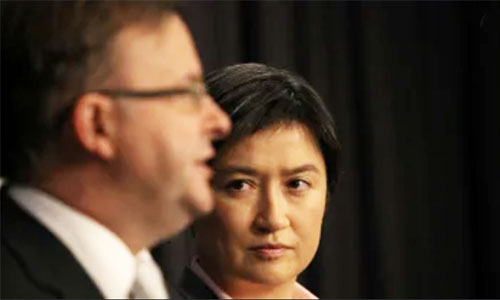
by DANIEL Y TENG – CHINA has issued a new list of “demands” for the Australian government to follow if it hopes to reset bilateral ties.
It comes as part of Beijing’s new charm offensive to win over the Labor government while claiming the former Morrison government was the “root cause” of deteriorating relations.

- Government told to issue own demands in response to China’s latest gripe list.
- Penny Wong meets with CCP counterpart.
- CCP says Wong agreed not to attempt to “contain” China.
Australia’s Foreign Minister Penny Wong met with Chinese Foreign Minister Wang Yi on July 8 on the sidelines of the G20 Foreign Ministers’ Meeting in Bali, Indonesia.
This was the first high-level meeting between Australian and Chinese ministers in almost three years.
SPIRAL
Relations have been on a downward spiral after Beijing launched a trade war against Australian exporters in response to calls from former Prime Minister Scott Morrison for an independent investigation into the origins of COVID-19.
Ms Wong said she welcomed the discussion, which was focused on issues of “prosperity, security, and stability of the region”.
“We spoke frankly and listened carefully to each other’s priorities and concerns,” she said in a statement.
“I raised Australia’s concerns about a range of bilateral, regional, trade and consular issues.”
“We have our differences, but it is in both our countries’ interests for the relationship to be stabilised.”
The new Left-leaning Labor government has walked a fine line to try to differentiate its foreign policy from its predecessor.
One point of difference has been the government’s more open support for climate change action; the other is its emphasis on “listening” to the concerns of other nations.
Meanwhile, Beijing responded to the meeting by saying that Foreign Minister Wong had no intention to “exaggerate the differences between the two sides”, nor would it attempt to “contain China”.
Further, Chinese Foreign Minister Wang Yi claimed the “root cause” of difficulties in bilateral ties over the past few years was the Morrison government treating Beijing as a supposed rival or threat, according to a statement on the Chinese Foreign Ministry website.
He hoped Australia could “seize the current opportunity” to improve relations and outlined four actions it needed to take:
- Regard China as a “partner rather than a rival;”
- Seek common ground between both nations while shelving differences;
- For Australia to avoid being “manipulated by any third party”—a reference to the United States.
- Build positive and pragmatic public support.
The list comes on top of an earlier document of “14 grievances” leaked to Australian media outlets from the Chinese Embassy in Canberra that contained specific demands such as overturning the 5G ban on Huawei, and repealing the country’s foreign investment interference laws.
TRACTION
However, the Chinese Communist Party’s charm offensive will gain little traction in Australia, according to Michael Shoebridge, defence director at the Australian Strategic Policy Institute.
“Beijing is clearly trying to throw the previous government under the bus and blame it for the relationship” he told The Epoch Times.
“But the new government is quite clear eyed and saying, ‘Well, actually, it’s the structural behaviour of the Chinese government and its institutions [that’s the problem]’.”
Mr Shoebridge said the CCP was also trying to leverage the Labor government’s attempt to differentiate itself from the previous government.
“They’re hoping that can be a bit of a political wedge.”
Lincoln Parker, chair of the Liberal Party’s Defence and National Security Policy Branch, said Australia should issue its own list of demands in response.
“At the top of the list would be to release all Australian political prisoners, withdraw from the Solomons and meddling in the Pacific Island countries,” he said.
“Number three would be to drop all illegal tariffs on goods and services. Stop massive technology theft, spying, and coercion.
“Stop slave labour using the Uyghurs, reparations for COVID-19, and number seven, recognise Taiwan’s sovereignty.”
Labor’s minister for international development and the Pacific, Pat Conroy, said the government would still pursue key issues of national interest with Beijing.
“There are significant issues that we need to resolve such as the trade blockage, such as the detention of several Australian citizens and we’re working hard on that,” he told ABC Radio on July 11.
COMMITTED
“But this is a process that will take a long time, and we’re committed to that dialogue, but our national interest has not changed.”
Meanwhile National Party leader David Littleproud defended the previous government’s handling of Beijing, calling the list of demands “propaganda”.
“We’re happy to have dialogue, but it’s not giving demands, that’s not how you throw your weight around the international community,” he told Sky News Australia.
“This should be about having open dialogue, respectful dialogue, respecting one another’s sovereignty.” PC









